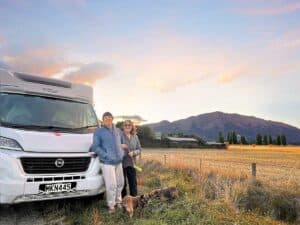When the whole of New Zealand is your home—as it is for many of us who live on the road—it’s essential that we do our part in helping to look after it. Living sustainably doesn’t mean becoming a hippy or changing your lifestyle. As motorhomers, we are automatically part of a self-sufficient community. Choosing to live smaller and with less goes hand-in-hand with caring for the environment.
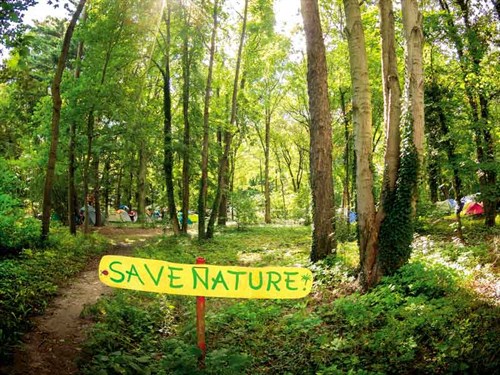
Living on the road is inexpensive. Despite the cost of fuel, it is generally far cheaper to travel for a living than to maintain a house, cars, gadgets, and all the other things we leave behind in a conventional life. Whether you’re in a campervan, bus, or caravan, it is essentially a tiny house on wheels, and tiny houses are highly efficient dwellings.
They make maximum use of every square foot and eliminate unnecessary space. We can live in them in comfort and perfectly happily without debt. If the space you’re in already has everything you need, who needs more room?
Your consumption is visible
Until we set out on the road, it never occurred to me how much of our consumption went unseen. It goes without saying that you consume less of everything in a motorhome than in a house, but I never thought about the difference being actually visible. For example, the amount of rubbish we throw away now is small. Our on-board rubbish bin is tiny and contains all our household waste. When I lived in a house, I had a 40-litre bin in the kitchen alone.
The amount of water we conserve now is also staggering compared to our previous life. Every drop you use that you don’t drink has to be disposed of somehow, rather than countless litres disappearing down a plughole every day. And if you’re using campsite showers, they tend to be much shorter because you have other campers to think of or are limited to a few minutes in a coin-operated shower.
I wash as much of our laundry as possible by hand, using a fraction of the water I used to put through my 7kg washing machine. And just because we don’t live in a large home, it doesn’t mean we can’t do many of the same things other people do to save money and resources.
For example, despite living in a van only a few metres long, we still manage to grow our own food, and our food waste gets recycled where possible and turned into vegetable stock.
Save your energy and resources
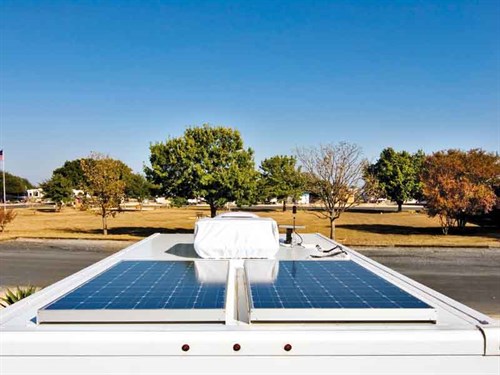
The smaller your home, the more energy- and resource-efficient it is. This applies to both heating and cooling. As for power, if you don’t have them already, solar panels are an excellent investment, being both kind to the environment and giving you a free and inexhaustible power supply. While this does involve an initial outlay, you can recover your investment within a couple of years, and from then on, enjoy free energy for years to come.
Using methods such as solar energy to power your motorhome is one of the best ways to live sustainably. All the information you need to work out your power consumption and how to choose the right solar panels is available online.
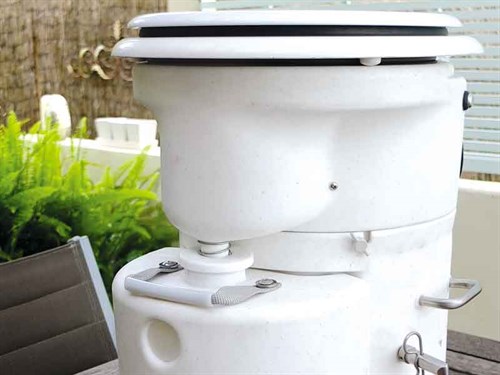
While you’re at it, why not check out other eco-friendly solutions that can easily be adapted for use in your motorhome, such as water-saving shower heads and composting toilets? When you think about it, it’s no different to carting around your black water tank. And on the positive side, you’d never have to deal with one of those again.
Choose smart, drive smart
It’s also possible to keep fuel costs to a minimum, even when you live in a motor vehicle. Just as with cars, the larger your mobile home is, the more fuel it will burn. If you genuinely don’t require the extra space of a larger motorhome, choose a smaller, more fuel-efficient model.
Another simple way to keep fuel costs and emissions down is to travel less and stay longer in one place. Aim to look for campgrounds within a 100km radius and stay there for as long as it is feasible, rather than constantly hopping from campsite to campsite.
Sustainable living
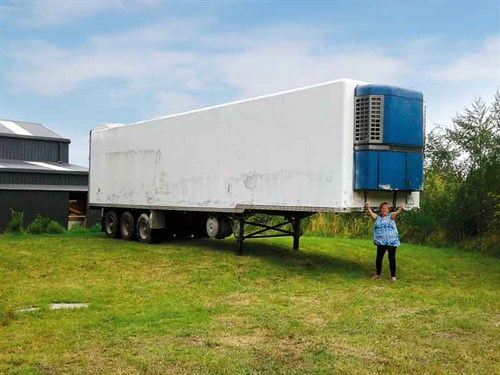
Before as a freezer truck
Sharla May is an expert on sustainable living. Having built her own tiny house from scratch, she now has her eyes set on downsizing even further, living on the road permanently in a bus.
Sharla’s wealth of experience and knowledge was invaluable to us when we first began researching living on the road. Her website, Alternative Living (alternativeliving.co.nz) is a one-stop shop for information about the many ways you can downsize your life and live greener, with articles and videos on everything from mobile homes in every shape or form to container houses and off-grid living.
Sharla is also the founder and organiser of the annual Tiny House Convention, which is being held on 29 September this year in Carterton. Last year’s event was a sell-out and with tickets already selling fast, this year promises to be even bigger. For more information, visit tinyhouseconference.nz.
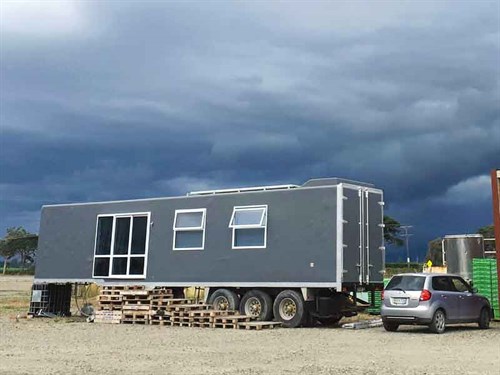
Now completed and on sale on Trademe
As a large group of people who spend most of our time in the great outdoors, we motorhomers each do our bit to help preserve the environment that is so precious to us. Making a difference can be as easy as picking up litter rather than walking past it, or getting involved in sustainable organisations such as the Million Metres Streams Project, whose mission is to restore the health of our waterways through riparian planting.
Between our lifestyle and our actions, we can reduce our carbon footprint and take personal pride in the positive effects, while also inspiring those around us.
Quick eco-friendly tips

Recycle as you travel
Separate ‘real’ rubbish from recyclables in your motorhome and take note of recycling categories and use accordingly when staying at a campground. Use as few disposable items such as cutlery and containers as possible in favour of the real thing.
Buy local
Whenever possible, buy from the many local produce stands or farmers’ markets you come across on the road. In doing so, you support local communities and reduce the amount of greenhouse gas created transporting your food.
Dry laundry in fresh air
Not all campgrounds allow you to put up a clothesline but a small A-frame clothing rack is cheap to buy and takes up very little room on-board. It’s cheaper than paying for campground or laundrette facilities, and so much nicer!
Drive less
Sounds funny when you live in a mobile home but changing your driving habits can dramatically reduce your carbon footprint. Walk, bike, carpool, or use public transportation whenever possible when you’re parked up.
Leave only footprints
It goes without saying that you should dispose of all rubbish responsibly and leave nothing behind. It’s not just our job as responsible campers but it’s also vital to ensure the continued beauty of this country we all call home.



